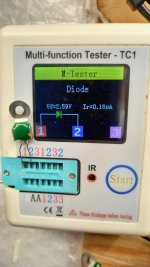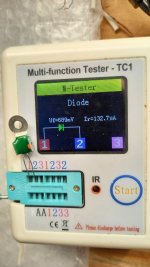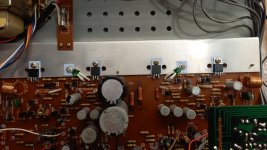Can anyone help me identify this diode? They come from an Audiosonic ST-8000, about which no information can be found. It appears that the diode with 689mv is defective.
I want to replace them both and thought about 3x or 4x 1N4148, but when measuring I can't get an exact result/match. (By the way: Uf 2.59v on the tester gives Uf 2.21v on my multimeter with leads)
Does anyone have any good advice? Thank you!
I want to replace them both and thought about 3x or 4x 1N4148, but when measuring I can't get an exact result/match. (By the way: Uf 2.59v on the tester gives Uf 2.21v on my multimeter with leads)
Does anyone have any good advice? Thank you!
Attachments
Last edited:
My first thought is those green things are not diodes, since they are fixed on the heatsink maybe ntc resistors?
These will be a stack of series diodes to act as thermal compensation - rather than Vbe multiplication, using multiple pn junctions - probably 4 of them - the second one has several junctions fried I suspect. If they were ntc resistors the tester would claim they were resistors, not diodes.
Check them in reverse with the multimeter: if they are diodes, the reading will be infinity, and it they are NTC they will display an identical value in both directions
So it is 2.6V @ 0.16μA, and 0.69V @ 133μA.
Or reversed:
When conductive at just over 0.1mA the reading is 0.7V, almost closed near nill it is 2.6V.
It seems not to behave like a diode, nor like a zener.
Circumstantial evidence is needed here!
Circuit drawing? Pictures of top & btm pcb can help.
Or reversed:
When conductive at just over 0.1mA the reading is 0.7V, almost closed near nill it is 2.6V.
It seems not to behave like a diode, nor like a zener.
Circumstantial evidence is needed here!
Circuit drawing? Pictures of top & btm pcb can help.
I replaced the 0.69V @ 133μA diode for 4x 1n4148 diodes. The bases of the left output transistors are now around 0.68V. That seems quite good, previously it was far too low. I understand that there is a range between 0.6 ~ 0.7V for this base voltage. Perhaps it would be better to reduce the base voltage of the output transistors a bit more by placing 3x 1n4148 (instead of 4) ?
@Citizen124032: I don't know as much about it as you do, but I just assume that this concerns diodes in series. Thanks for the contribution.
@Citizen124032: I don't know as much about it as you do, but I just assume that this concerns diodes in series. Thanks for the contribution.
Last edited:
0.7V is too much.... try 3 didoes, as you suggested.
Try with an oscilloscope and 1kHz input signal... look for the onset of a clean sinewave. Try 2 didoes, and then move to 3 didoes. If the sinewave is choppy with 2 diodes, but clean with 3, stay with 3 diodes.
Try with an oscilloscope and 1kHz input signal... look for the onset of a clean sinewave. Try 2 didoes, and then move to 3 didoes. If the sinewave is choppy with 2 diodes, but clean with 3, stay with 3 diodes.
I just tested with 3x 1n4148 in series and this gave too low a voltage at the base of the 2 output transistors. About 0.38V.
With 1N4148 in series I do not get a voltage closer to 0.6V. (4x = 0.68V 3x = 0.38V) Anyone have a suggestion, perhaps for a different type of diode?
With 1N4148 in series I do not get a voltage closer to 0.6V. (4x = 0.68V 3x = 0.38V) Anyone have a suggestion, perhaps for a different type of diode?
I think i will leave it with 4x 1n4148 and 0.68V at the bases of the 2 left output transistors. Although right channel has 0.61V with original diode, the base transistor voltages at left channel do not exceed 0.7V
Last edited:
Buy 100 1N4148´s, and test the forward voltage. Then chose the quad with the lowest fV 😉
Last edited:
Three 1N4148’s and a schottky. Elvee does that trick in some of his crazy prototypes to trim the bias without resorting to a pot. The problem with those diode stacks is that each one is closer to a diode-connected TIP41 than a 1N4148 or 1N4004. 3 and 6 amp 50 volt (not the high voltage versions) would be about right too, but they won’t fit. Especially not four of them. Another fix that works is to take a large-ish high gain part like a D44H8, and put 3 1N4148’s from collector to base, effectively making a 4Vbe diode-connected transistor. By operating the 1N4148’s at base current the drop falls in the .5 to .55 range like these circuits want.
Probably right, but not suited for the purpose. The housing makes it impossible to react to the surrounding temp.I think higher current diodes have lower forward voltage. Like 1n400x type diodes.
Small glass diodes like BAV91, 1N4148 and the likes do a far better job for this.
1N5402 is actually the right amount of drop, but just the wrong damn case. At least you can get a small signal schottky in the DO-35. I think that’s the 4148 look alike.I think higher current diodes have lower forward voltage. Like 1n400x type diodes.
Three 1n4148 plus a shottky is about in between a red and a green led. A led glued to the heatsink, could that work?
- Home
- Amplifiers
- Solid State
- Unknown diode


